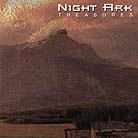October 2000
Ara Dinkjian and his ensemble, Night Ark, enjoyed many mid-'80s releases on RCA. They’re celebrated participants of various jazz festivals, such as Montreux, Istanbul, Yerevan and Jerusalem. However, it’s probably fair to say that US audiences have not traversed these exotic vistas in Dinkjian’s ark in the same boisterous, exuberant and familiar fashion as their more exposed European and Minor Asian musical brethren. This compilation on Crossroads could rightfully change this oversight. Dinkjian is a master composer of American upbringing whose Armenian parents took pains to keep their own cultural traditions alive in their new home. His aural language, a combination of Occidental and Oriental influences, thus had time to gestate and mature into an original organic syntax, a kind of pan-cultural global tongue, if you will. Such musical dual-citizenship makes Dinkjian authentic and accessible to listeners from either hemisphere. It reflects an intrinsic musical integrity that is very different from superficially filching foreign musical dialects purely to revitalize one’s own co-opted and worn-out language, as so many American artists seem compelled to do these days. His father was a well-known singer of popular Armenian folk songs. While Dinkjian composes for instruments, his early exposure to lyric-driven song seems to have endowed him with an uncanny talent for haunting melodies. Many of them have been appropriated and set to lyrics by the likes of Greek vocalist Eleftheria Arvanitaki or Turkish singer Sezen Aksu. In fact, Arvanitaki’s 1994 album The Bodies and The Knives on Polydor [314 527 059-2] should be mentioned here as an outstanding example of Dinkjian’s melodic mastery. He adapted and arranged all 12 songs, and the results are truly mesmerizing. Dinkjian’s chosen instruments are the diverse Minor Asian guitar relatives and precursors -- the straight-necked saz and the crooked-neck ud lutes, the round-bodied banjo-type cumbus and the Portuguese mandolin. He also plays the kaval flute and the Turkish kanun zither. Dinkjian has participated in many a masterful collaboration with expatriate Turkish multi-instrumentalist Omar Faruk Tekbilek on the Celestial Harmonies label. Tekbilek and his group are also names that lovers of this particular genre should note. Ditto for master percussionist Arto Tunçboyaciyan, who appears both with Night Ark and Faruk’s ensemble and whom I unexpectedly discovered last on Gerardo Nunez’s flamenco-fusion album Calima on Alula. If this album deserves even a minor complaint, it is simply that all tracks have been previously released. In fact, more than half are culled from Picture. However, my initial disappointment was soon tempered -- not only is the recording quality superb, but the few unfamiliar tracks would warrant a purchase by themselves. The core ensemble of Ara and Arto includes Shamira Shahinian on various keyboards and Ed Schuller on bass. Armen Donellan joined the group at a later date and takes Shamira’s place on a few tracks. The most immediate element of Dinkjian’s music is lyricism. It categorically eschews the Middle Eastern, heavy-attack modes that can appear so jarring to Western ears. Instead, it conveys itself as an intimate form of chamber music, with occasional pianistic flights of jazz fancy -- or perhaps a more accurate comparison would be to the dreamy elements of Indian alap, those weightless, exploratory intros to ragas that hover over a kind of drone that here is replicated by subtle synth washes. The minimalism of Norwegian saxophonist Jan Garbarek comes to mind, although stylistically there is no relation except for the simplicity of form. It omits unnecessary notes to convey the message clearly and with power. There is evidence of the melancholic harmonic minor modes so prevalent in the Middle East. But again, they are employed with subtlety and are wholly integrated -- they are not truly Turkish, Armenian or Greek, but exist beyond such confining boundaries. Asked about his ensemble’s name, Dinkjian replied "The ark represents a vessel of rescue -- in my own way, I was trying to gather and transport my own musical culture." Even without cataclysmic forty days and nights of endless rain and Uncle Noah to the rescue, hop aboard this Night Ark. I guarantee a discovery that might just make your day. GO BACK TO: |
 Night Ark - Treasures
Night Ark - Treasures![[Reviewed on CD]](../format/regcd.gif) Aficionados
of Middle Eastern-influenced world-music fusion fare have reason to rejoice. One of the
early pioneers of the genre -- so early in fact that the term "world music"
hadn’t yet been coined -- has just been rediscovered and given the royal 24-bit
remastering treatment to boot.
Aficionados
of Middle Eastern-influenced world-music fusion fare have reason to rejoice. One of the
early pioneers of the genre -- so early in fact that the term "world music"
hadn’t yet been coined -- has just been rediscovered and given the royal 24-bit
remastering treatment to boot.